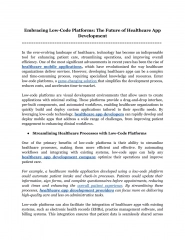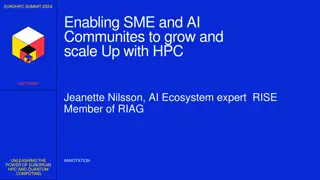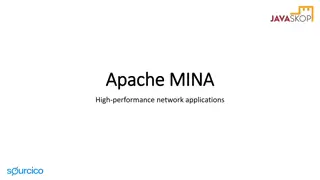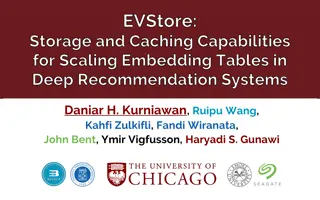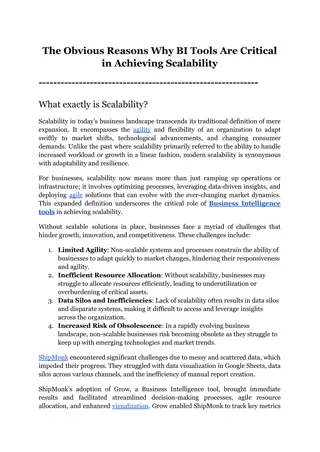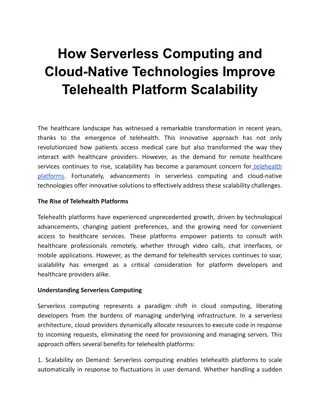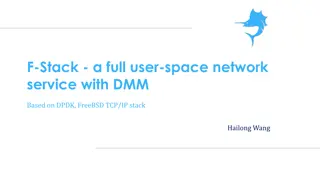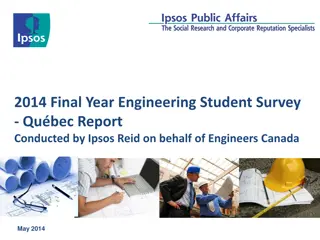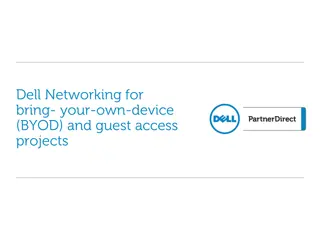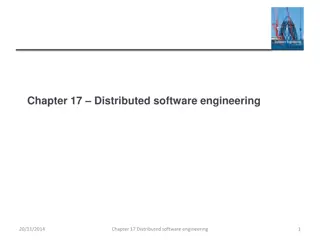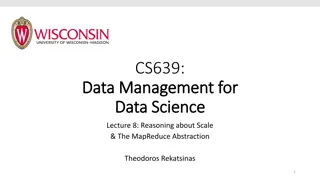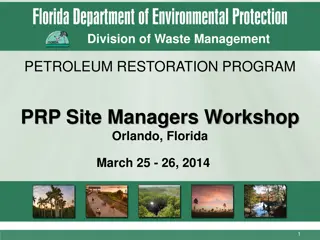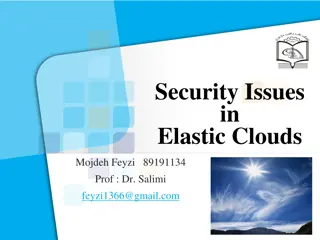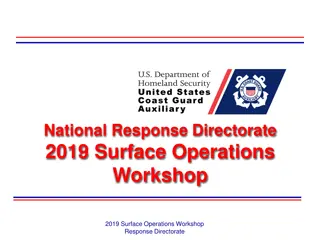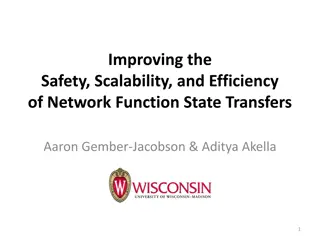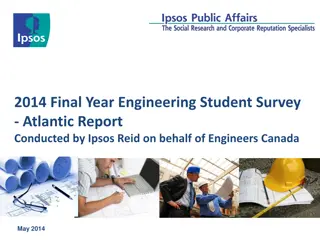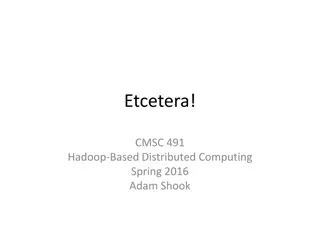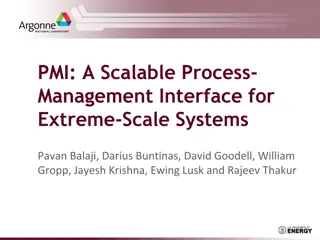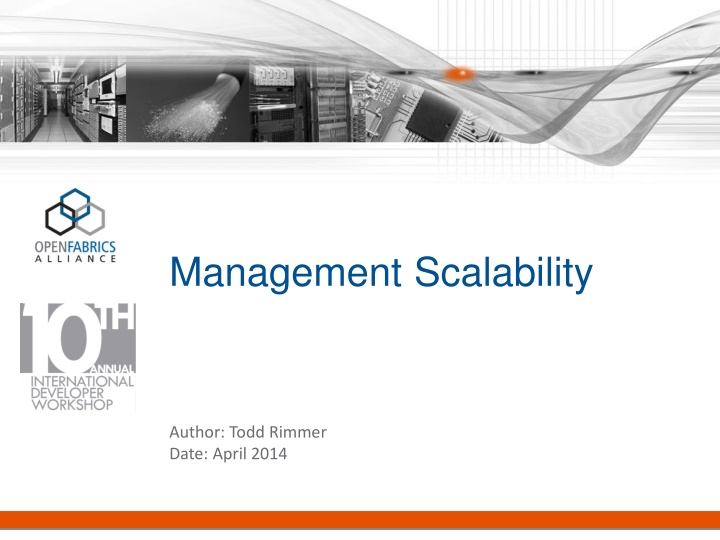
Optimizing Management Scalability for HPC and Cloud Environments
Explore the challenges and projected requirements for management scalability in high-performance computing and cloud environments. Learn about key bottlenecks, path record queries, and the need for standardization in user space APIs. Discover strategies for enhancing scalability and optimizing performance in diverse cluster configurations.
Download Presentation

Please find below an Image/Link to download the presentation.
The content on the website is provided AS IS for your information and personal use only. It may not be sold, licensed, or shared on other websites without obtaining consent from the author. If you encounter any issues during the download, it is possible that the publisher has removed the file from their server.
You are allowed to download the files provided on this website for personal or commercial use, subject to the condition that they are used lawfully. All files are the property of their respective owners.
The content on the website is provided AS IS for your information and personal use only. It may not be sold, licensed, or shared on other websites without obtaining consent from the author.
E N D
Presentation Transcript
Management Scalability Author: Todd Rimmer Date: April 2014
Agenda Projected HPC Scalability Requirements Key Challenges Path Record IPoIB Mgmt Security Partitioning Multicast Notices SA interaction Call to Action March 30 April 2, 2014 #OFADevWorkshop 2
Projected HPC Scalability Requirements Perf increase 2x/year 700000 600000 Rapidly increasing node counts HPC and Cloud 500000 400000 #1 Traditional CPU chips #10 Traditional CPUs 300000 Due to slower pace of interconnect speed growth need multi-rail clusters HCA counts will grow even faster #1 Many Core CPUs #10 Many Core CPUs 200000 100000 0 2011 2012 2013 2014 2015 2016 2017 Time March 30 April 2, 2014 #OFADevWorkshop 3
Key Mgmt Scalability Bottlenecks PathRecord Query IPoIB ARP March 30 April 2, 2014 #OFADevWorkshop 4
PathRecord Query Today User apps Use rdma CM ibacm optional cache Use libumad and hand craft Use UD QPs Hand build PR (MPIs) Other (via IPoIB ) Kernel ULPs Call ib_sa No single place to put PR optimizations Data Applications, User File Systems, MPIs, etc SFI rsockets rdma cm ibverbs IB cm Mgmt Apps, SM, Diags, etc sockets ibacm libumad User Kernel Ksockets IP, UDP, TCP File umad Rdma-cm Systems (Lustre, Panasas NFS RDMA) uverbs iw cm Ib cm ULPs (SRP, RDS) Ib_sa IPoIB Ib_mad ibcore IB VPD iWarp VPD March 30 April 2, 2014 #OFADevWorkshop 5
PathRecord Query Scalability Need to 1st standardize a user space API Libfabrics (OFI WG) and RDMA CM are logical choices Use API in all ULPs, benchmarks, demos, tools, diagnostics, etc. Both kernel and user space So everyone benefits from scalability improvements Decouple API from IPoIB Multi rail clusters may not want IPoIB on all rails March 30 April 2, 2014 #OFADevWorkshop 6
PathRecord Query Need a plugin architecture behind the API Need a variety of plugins Small clusters can do direct PathRecord query Modest clusters can do PathRecord caching Large clusters need PathRecord replicas or ibssa Huge clusters need algorithmic approaches Topology dependent optimizations Permit research and experimentation Start with direct, ibssa and cached plugin One size does not fit everyone March 30 April 2, 2014 #OFADevWorkshop 7
IPoIB ARP Scalability Need a multi-tiered approach in IPoIB Modest clusters can do standard ARP/broadcast Perhaps with long ARP timeouts (hours, days) Large clusters need pre-loaded ARP tables Huge clusters need algorithmic approaches Topology dependent Need to 1st standardize a plug-in API API needs to tie into PathRecord Plug-In Implement std ARP and pre-loaded plugins 1st March 30 April 2, 2014 #OFADevWorkshop 8
Other Mgmt Issues Umad security Partitioning Multicast Notices SA interaction pacing March 30 April 2, 2014 #OFADevWorkshop 9
Mgmt Security Umad security issues Requires root access by default Use of umad by applications forces opening security Umad is too easy a vehicle to attack server or cluster First steps Rapidly move applications away from using umad Simplify API, remove apps hand building packets Multicast membership, Notices, etc Remove need for SM and diagnostics to be root Need ability for secured umad use March 30 April 2, 2014 #OFADevWorkshop 10
Partitioning Proper Operation will be necessary for HPC Cloud Don t assume full membership in default partition Carefully reading of IBTA 1.2.1 reveals: Default partition is just a power on default, not a guarantee If it was a guarantee, IBTA partitioning would be useless everyone could use 0xffff to talk to anyone Only guarantee is membership in 0x7fff to permit SA query Fix P_Key assumptions in SA queries, ibacm, tools, etc Proper use of PathRecord query will solve most of this Search local P_Key table to decide if 0x7fff or 0xffff present IPoIB react to P_Key table changes during Port Initialize especially entry 0 PKey indexes can change between boot and port Active Part A Part B 0x7fff Part Part C March 30 April 2, 2014 #OFADevWorkshop 11
Multicast Multicast in IBTA Each node can join/leave a group only once Multicast join/leave are for whole node Multicast use goes beyond just IPoIB ibacm, MPI collectives, kernel bypass for FSI RDMA CM has some APIs, needs to coordinate w/kernel Need API w/kernel muxing of multicast membership IBTA compliant node level interactions with SM/SA Allow multiple processes, kernel and user to join a group Automated cleanup when processes die Also removes another need for umad access by apps March 30 April 2, 2014 #OFADevWorkshop 12
Notices Use of Notices by applications is scalability issue Can force O(N) messages from SM on each event Example: turn off 100 nodes in 10K fabric -> 1M notices Example: turn off 50K nodes in 100K fabric -> 2.5B notices At host need Notice muxing Each node register/receive/deregister only once Need kernel muxing of notice registration Need kernel muxing of notice delivery/ack Need cleanup when processes die Also removes another need to umad access by applications Should we restrict or disable use of notices? March 30 April 2, 2014 #OFADevWorkshop 13
SA Interaction Scalability Centralization of PR, Multicast and Notices is 1st step This then permits tuning of SA interactions based on scale SA Response Timeout/Retry Handling Clients today use fixed timeouts Timeouts chosen a priori without knowledge of SA nor fabric load Need centralized config of timeouts and retry settings As opposed to per application constants Retries should perform non-linear backoff SA Busy Response Handling Present OFA code does immediate retry Prevents SA from using BUSY to pace its workload SA forced to discard BUSY should cause client backoff before attempting retry Non-linear backoff also recommended March 30 April 2, 2014 #OFADevWorkshop 14
Next Steps Lets all collaborate to solve these challenges Your participation in discussion is encouraged Lets be committed to solving these long standing issues March 30 April 2, 2014 #OFADevWorkshop 15
Summary Cluster sizes will grow year over year OFA has some long standing scalability issues Solutions are possible Lets all commit to making it happen March 30 April 2, 2014 #OFADevWorkshop 16
Thank You #OFADevWorkshop

